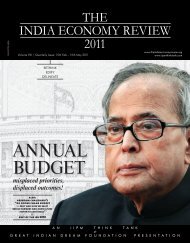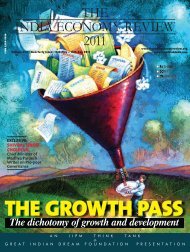Download - The India Economy Review
Download - The India Economy Review
Download - The India Economy Review
Create successful ePaper yourself
Turn your PDF publications into a flip-book with our unique Google optimized e-Paper software.
P LANNING P ARADIGM<br />
future from the point of view of society as<br />
a whole. A second possibility is for the<br />
government to do an entire comprehensive<br />
evaluation of all agencies on a periodic<br />
basis with each and every agency’s<br />
continued existence contingent on their<br />
worth at the time of the evaluation.<br />
Even if future evaluation of government<br />
agencies is predetermined at incep-<br />
tion or there is a periodic general evaluation<br />
of all government agencies, a major<br />
problem, perhaps even an insurmountable<br />
one, is that, the evaluation of government<br />
functions, especially in democracies,<br />
is extremely diffi cult, and, the<br />
pruning, the winnowing down of the<br />
government and the elimination of agencies<br />
deemed no longer to be effective is<br />
even more diffi cult.<br />
An essential reason for the complication<br />
is the valuing of government goods<br />
and services and the agencies providing<br />
them. For most government goods, there<br />
is no market value on these goods and<br />
services. How does one value these goods<br />
and services when there is no market<br />
value and when different people, different<br />
constituencies, value them differently,<br />
sometimes totally differently? Can cost<br />
benefi t analysis be used effectively when<br />
the very value of the benefi ts is just what<br />
is under question? In the process that is<br />
commonly used to assess the value of an<br />
agency, there is generally an upward bias<br />
in the estimate of the worth of an agency.<br />
Typically, in order to evaluate an agency,<br />
to evaluate the value of the good or service<br />
an agency provides, experts or profes-<br />
18 THE IIPM THINK TANK<br />
sionals in the good or service are generally<br />
consulted. However, a lot of times,<br />
these experts are experts or have become<br />
experts precisely because they work or<br />
have previously worked in providing the<br />
good or service. This means, as a rule,<br />
that they have a vested interest in the<br />
continuance of the good or service and<br />
are inclined to overstate the value of the<br />
In a democracy, people expect the<br />
govt to help them in the face of life’s<br />
diffi culties to try to help them<br />
good or service. For instance, the government<br />
might bring in an army general to<br />
discuss whether there is need for the continuance<br />
of a particular military agency<br />
for defense.<br />
In addition, there is a potential unemployment<br />
problem. <strong>The</strong> government is<br />
always subject to competing welfare goals<br />
that are not necessarily compatible. In a<br />
democracy, people expect the government<br />
to help them in the face of life’s<br />
diffi culties, or, at least, to try to help<br />
them. One of the goals of government is<br />
to maintain high levels of employment. If<br />
the government eliminates an agency of<br />
government that is now dysfunctional in<br />
order to increase effi ciency within the<br />
government itself, or in the economy as a<br />
whole, it generates unemployment. If<br />
there are a large number of people in the<br />
agency, its elimination is also likely to<br />
have substantial negative multiplier effects<br />
on the economy.<br />
Making a judgment on the continual<br />
existence or elimination of a government<br />
agency may be less onerous than deciding<br />
on the scale of operation of an agency<br />
once the decision for its continued existence<br />
is deemed to be appropriate. Of<br />
course, the optimal size of an agency is up<br />
to the point where the marginal benefi t<br />
equals the marginal cost of running the<br />
agency. If there is a hard time agreeing on<br />
valuing the total value of an agency, how<br />
much more so, if even possible, of getting<br />
people with different assessments of value,<br />
to agree on the value of the marginal<br />
benefi t of an agency.<br />
What about planning? Is economic<br />
planning valuable? How valuable? <strong>The</strong><br />
answers are, to say the least, both historically<br />
and at the present time, a bit<br />
controversial. <strong>The</strong> valuation of planning<br />
differs depending on who you ask, and, it<br />
must be kept in mind, it is the valuation<br />
of planning that is fundamental in making<br />
the decision of whether or not to have a<br />
planning agency and in properly ascer-





